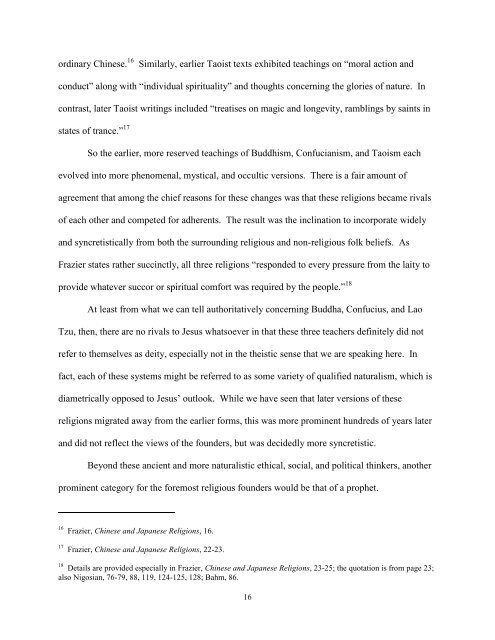Published by
299z7CN
299z7CN
Create successful ePaper yourself
Turn your PDF publications into a flip-book with our unique Google optimized e-Paper software.
ordinary Chinese. 16<br />
Similarly, earlier Taoist texts exhibited teachings on “moral action and<br />
conduct” along with “individual spirituality” and thoughts concerning the glories of nature. In<br />
contrast, later Taoist writings included “treatises on magic and longevity, ramblings <strong>by</strong> saints in<br />
states of trance.” 17<br />
So the earlier, more reserved teachings of Buddhism, Confucianism, and Taoism each<br />
evolved into more phenomenal, mystical, and occultic versions. There is a fair amount of<br />
agreement that among the chief reasons for these changes was that these religions became rivals<br />
of each other and competed for adherents. The result was the inclination to incorporate widely<br />
and syncretistically from both the surrounding religious and non-religious folk beliefs. As<br />
Frazier states rather succinctly, all three religions “responded to every pressure from the laity to<br />
provide whatever succor or spiritual comfort was required <strong>by</strong> the people.” 18<br />
At least from what we can tell authoritatively concerning Buddha, Confucius, and Lao<br />
Tzu, then, there are no rivals to Jesus whatsoever in that these three teachers definitely did not<br />
refer to themselves as deity, especially not in the theistic sense that we are speaking here. In<br />
fact, each of these systems might be referred to as some variety of qualified naturalism, which is<br />
diametrically opposed to Jesus’ outlook. While we have seen that later versions of these<br />
religions migrated away from the earlier forms, this was more prominent hundreds of years later<br />
and did not reflect the views of the founders, but was decidedly more syncretistic.<br />
Beyond these ancient and more naturalistic ethical, social, and political thinkers, another<br />
prominent category for the foremost religious founders would be that of a prophet.<br />
16 Frazier, Chinese and Japanese Religions, 16.<br />
17 Frazier, Chinese and Japanese Religions, 22-23.<br />
18 Details are provided especially in Frazier, Chinese and Japanese Religions, 23-25; the quotation is from page 23;<br />
also Nigosian, 76-79, 88, 119, 124-125, 128; Bahm, 86.<br />
16


